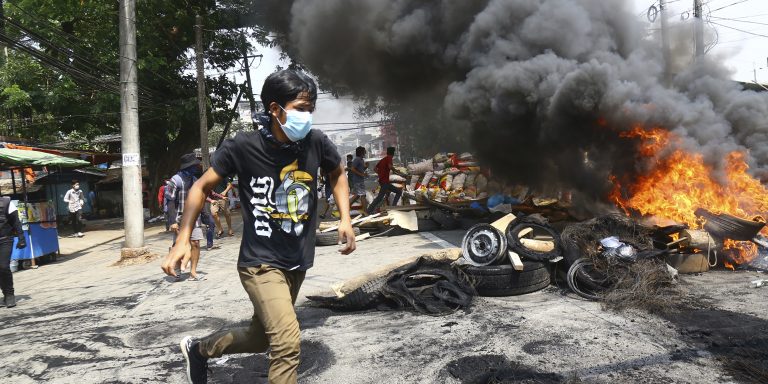INTELBRIEF
April 1, 2021
IntelBrief: Situation in Myanmar Deteriorates as the Military Opens Fire on Civilians

Bottom Line Up Front
- Myanmar’s military, the Tatmadaw, has killed more than 450 civilians since the February 1 military coup and the civilian uprising in response.
- Last weekend’s atrocities are merely the latest in a long string of war crimes and human rights abuses perpetrated by Myanmar’s military.
- While there have been some defections, the Tatmadaw is unlikely to break ranks in significant numbers since soldiers are thoroughly indoctrinated.
- Even when the government was ostensibly a power-sharing agreement, the military still controlled the most important levers of power in Myanmar.
Myanmar’s military, known as the Tatmadaw, has killed more than 450 civilians since the February 1 military coup and the civilian uprising in response to it. Millions of people have taken to the streets to protest the coup and call for the restoration of democracy, many also invoking the principle of “responsibility to protect” or “R2P”. Last Saturday, more than 100 civilians were killed, including young children, marking the deadliest day of the demonstrations. Security forces opened fire in residential areas and in some cases fired directly into people’s homes. Thousands more have been detained and tortured. Despite the egregious violence against civilians, demonstrators continue to protest against the military junta, demanding credible democratic rule. Protesters are outmatched, relying on slingshots and stones to defend themselves from the military’s vicious onslaught. The protests have been mostly peaceful, but this has not prevented the military from opening fire on crowds using live ammunition, and firing indiscriminately, including at children.
Violence has broken out in dozens of cities and towns across the country, including in Yangon and Mandalay, the two largest cities in Myanmar. Last weekend’s atrocities are merely the latest in a long string of war crimes and various human rights abuses perpetrated by Myanmar’s military. In response to events, the United States, the United Kingdom, and the European Union have slapped the Tatmadaw with sanctions. U.S. Army General Mark Milley, Chairman of the Joint Chiefs of Staff, released a statement condemning the violence. In his statement, Milley was joined by the chiefs of defense from Australia, Canada, Germany, Greece, Italy, Japan, Denmark, the Netherlands, New Zealand, South Korea, and the United Kingdom. The United States also suspended a trade pact with Myanmar, and while mostly a symbolic action, U.S. Trade Representative Katherine Tai noted that the halt would remain in place until democracy was restored.
While there have been some defections of military officers, experts believe the highly insular Tatmadaw is unlikely to break ranks in significant numbers, since soldiers are so thoroughly indoctrinated with propaganda. The soldiers are also closely monitored, including on social media. The Tatmadaw, comprised primarily, though not exclusively, of soldiers from the Buddhist Bamar ethnic majority, has long functioned as a state within a state. For decades, the military has targeted an array of ethnic groups, including Rohingya Muslims and members of the Karen, Kachin, and Rakhine ethnic groups. Influential Buddhist monks form part of Myanmar’s power base, working in tandem with the Tatmadaw. Ethnic minorities, who make up approximately one-third of Myanmar’s population, and shadowy foreign powers are frequently cited as looming threats by the military. The protests have been blamed on the alleged role played by foreign influence.
As in other countries where the military plays an outsized role in society, including Turkey and Pakistan, military officers in Myanmar maintain control over a vast array of business interests. Even when the government was ostensibly a power-sharing agreement with an elected constituency, the military still clung tightly to the most important levers of power in Myanmar. Since the coup kicked off, Aung San Suu Kyi, leader of the National League for Democracy, remains under house arrest, along with other leading figures in her party. Myanmar’s military has attempted to slander the protesters as criminals and terrorists, and coup leader Gen. Min Aung Hlaing has accused Suu Kyi of failing to investigate the military’s accusations of voter fraud.
In a sign of potential escalation, earlier in the week, the Tatmadaw launched airstrikes close to Myanmar’s border with Thailand, sending thousands of civilians flooding across the border into Thailand. Thai soldiers reportedly sent the civilians back into Myanmar. U.N. Secretary-General Antonio Guterres called the situation in Myanmar “absolutely horrendous” and urged the junta to “stop the killing...stop the repression of the demonstrations.” However, given the reluctance of Permanent Security Council members like China or Russia to effect meaningful change, the UN remains stymied in making any concrete contribution to resolving the crisis.